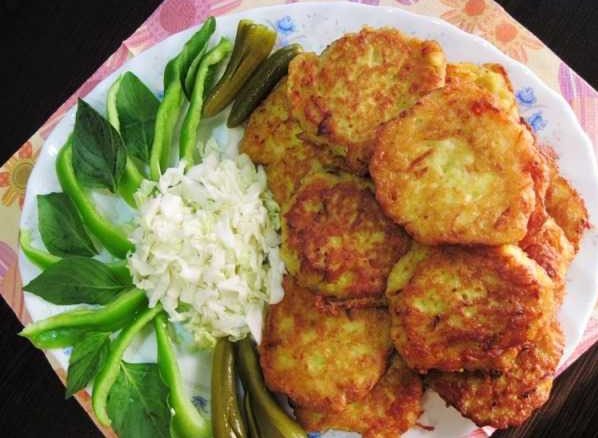Saturday 16 September 2017 - 10:39
Story Code : 275844
Kuku Sib Zamini; A simple, popular Iranian dish
IFP - Iranians make many different types of kuku � an egg-based dish � with a variety of flavorings. Some variations include Kuku Sabzi (herb Kuku) and Kuku Sib-Zamini (potato Kuku).
Here is the recipe for Kuku sib-zamini:
Ingredients
1 Kilogram of Potatoes
4 or 5 Eggs
2 Teaspoons of Baking Powder
Salt & Pepper: As much as needed
Instructions:
Cook potatoes in boiling water, remove the skins, and grate them. Then break the eggs in a separate bowl and beat them perfectly. Add salt, pepper and baking powder (or if you prefer Saffron) to the eggs. Then add the potatoes to the mixture and stir gently to combine.
You can fry the mixture in two ways:
Place a large non-stick frying pan on medium-high heat and add a few tablespoons of oil for shallow frying. In the first method, you can pour all the mixture into the pan and smooth it with the back of the spoon until all the surface of Kuku becomes smooth. Put the cap of the pan and lower the heat until you could easily cut the saut�ed mixture.
First, cut the Kuku into four parts and then fry the other sides. You can cut each slice into two to get eight pieces of Kuku. Serve them in a round dish and design it with tomato slices.
In the second method, you saut� tablespoons of the mixture in the oil. Each time you drop the tablespoons of the mixture into the frying pan, smooth and form it. When one side is fried, you must saut� the other side.
Two sweet and salty flavors are chosen for this meal. Some people add nectar to the cooked potatoes and some others add salt to the mixture made from raw potatoes.
People from the central province of Isfahan call it Ghandi Kuku (Sugar Kuku) and pour sap on it.
To prepare and cook this meal, you should consider the following:
� If you cook Kuku with raw potatoes, you can add cooked chicken or scented vegetables, but adding these ingredients to a kuku with cooked potatoes is not recommended.
� The good thickness recommended for this Kuku is between 0.5 and 2 centimetres, which you can change according to the taste. Do not forget that excessive thickness prevents Kuku from being cooked well and excessive thinness makes it dry and even leads to being burned.
� Apart from the mint or coriander in the recipe, you can use fresh mint alone or fresh basil and even dry thyme. In this way, Kuku�s taste will be unique.
� The best spice you should not forget about is saffron for sweet Kukus and turmeric next to saffron for salty Kukus.
# Tags











